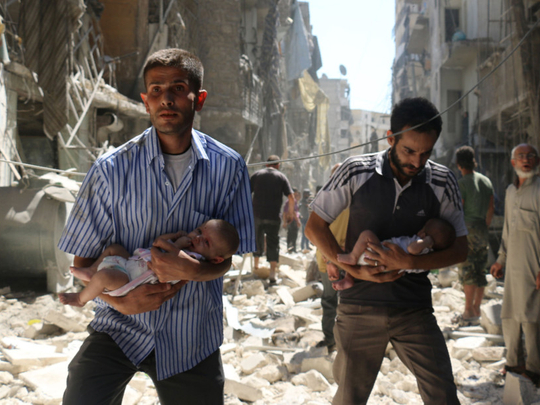
Aleppo: They cannot play, sleep or attend school. Increasingly, they cannot eat. Injury or illness could be fatal. Many just huddle with their parents in windowless underground shelters — which offer no protection from the powerful bombs that have turned east Aleppo into a kill zone.
Among the roughly 250,000 people trapped in the northern Syrian city are 100,000 children, the most vulnerable victims of intensified bombings by Syrian forces and their Russian allies.
Though the world is jolted periodically by the suffering of children in the Syria conflict — the photographs of Alan Kurdi’s drowned body and Omran Daqneesh’s bloodied face are prime examples — dead and traumatised children are increasingly common.
The routine in east Aleppo, where shell-shocked children are exhumed from rubble and left writhing in bloody clothes on dirty hospital gurneys, is a confluence of Syria’s young population, failed diplomacy and the reality of a war that appears to be worsening after more than five years.
“They’re trapped, and they have no way of escaping,” said Alun McDonald, a spokesman for the Middle East operations of Save the Children, the international charity. “That’s one reason we’re seeing such big numbers of child casualties.”
The people living in besieged rebel-held areas of Aleppo have shown a high level of resilience, moving schools and hospitals underground for protection.
But lately on the eastern side, McDonald said, “the bombing has become so intense, with such high-powered bombs, that even underground shelters aren’t safe anymore.”
Children in the besieged parts of Aleppo also face dire food and medicine shortages. Surgery and blood transfusions required for treating bomb wounds are, by many accounts, practically impossible now. Medical workers have left children to die on hospital floors for lack of supplies.
Aid groups estimate that there are only 35 doctors remaining in East Aleppo — one for every 7,143 people, assuming a population of 250,000 people. By comparison, in New York — which has the worst doctor-patient ratio of any American city — it is one for every 912 people. However, some groups say the population of eastern Aleppo is much lower, in the tens of thousands.
With hundreds of thousands of people killed in Syria since the start of the war in 2011, and half the population displaced, that anyone is even still inhabiting east Aleppo, much less raising children there, may seem surprising.
Civil defence workers said many families, mistrustful of government offers of safe passage before the bombing intensified, had elected to stay. The government says rebels are preventing people from leaving. Others said the residents of east Aleppo — like many other Syrians — are simply reluctant to abandon their homes and properties even if they could leave.
“They don’t want to be refugees,” Singer said. “It’s their land, they’re very passionate about their houses. They say, ‘This is my house, my land.’”
The indiscriminate nature of the bombings appears to be of little concern to President Bashar Al Assad’s government and its Russian allies, who have made it clear that they intend to retake east Aleppo regardless of the casualties and destruction.
Hannah Stoddart, director of advocacy and communications for War Child, a charity based in London, said Al Assad’s government had violated international law by targeting “built-up areas, schools and hospitals, where there’s a much higher chance that children will be hit.”
“On top of that, aid access is being blocked,” she said in a statement. “So if children aren’t killed or injured, they are at risk of starvation.”
Ammar Al Salmo, who leads the east Aleppo unit of a civil defence group, said in a WhatsApp call that the government’s tactics “bring terror into civilians’ hearts and make it hard for rescuers to help evacuate casualties”.
The bombings, he said, have been random and irregular.
“Sometimes in the middle of the night, sometimes in the early morning so people cannot predict,” he said. “It is a revenge campaign against the people who decided to stay in Aleppo.”












